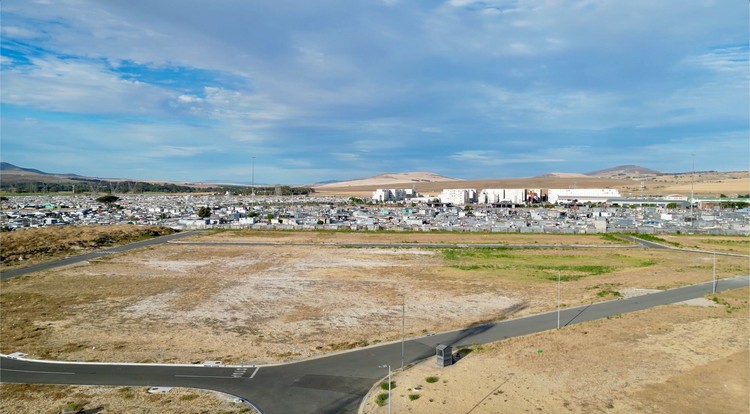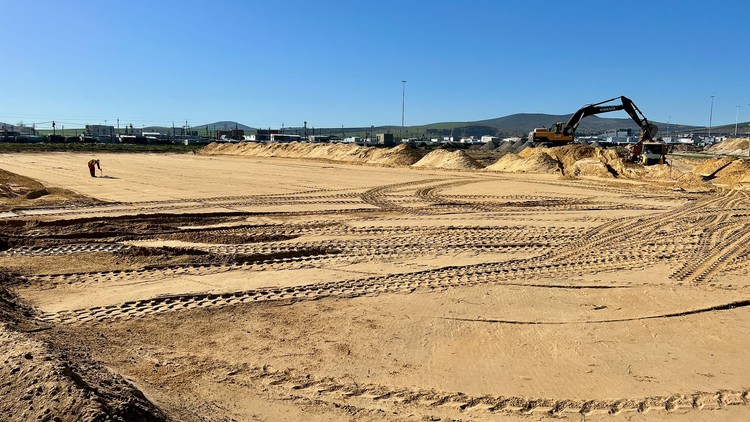Housing project for 500 Dunoon families put on hold
Western Cape government revising its plan and budget
Site clearance being conducted in 2022 for the Killarney Gardens housing project. The project is currently on hold. Archive photo: Peter Luhanga.
- The Killarney Gardens housing project set to benefit 488 families in Dunoon has ground to a halt.
- The project was announced in 2020 during the Covid pandemic by former human settlements minister Lindiwe Sisulu to alleviate overcrowding in Dunoon’s informal settlements.
- The Western Cape government has revised its plans for the project and is reviewing the budget.
- The houses were supposed to have been completed by June 2024. Government has not committed itself to a new deadline.
The Killarney Gardens housing project, intended to alleviate overcrowding in Dunoon’s informal settlements, has ground to a halt.
Announced by former Minister of Human Settlements Lindiwe Sisulu in April 2020 at the peak of the Covid-19 pandemic, it was initially going to provide accommodation for 1,500 families.
After lengthy delays and legal wrangling over town planning objections and appeals, site works eventually got under way by July 2022, raising the hopes of housing beneficiaries.
But the Western Cape Department of Infrastructure has paused the project over cost concerns and has revised its plans.
Provincial infrastructure spokesperson Jandre Bakker said the province acquired the land in 2018 for human settlement to serve various communities in the surrounding area using the Breaking New Ground model (a revised RDP model).
But when the Covid pandemic hit, then National Minister of Human Settlements Lindiwe Sisulu identified Dunoon for “de-densification”.
“Since the City of Cape Town did not have vacant land available to facilitate the de-densification of these informal settlements, it was agreed that part of the land acquired by the provincial government would be utilised for the development of a Transitional Residential Area,” said Bakker.
He said the department initially planned to build three-storey transitional relocation units of 24m2 to de-densify the informal settlement as a Covid mitigation measure, providing 1,500 “housing opportunities” as a short-term solution.
But post-pandemic, the department had to consider a longer term, sustainable model providing permanent accommodation. The department revised the housing model to Duplex and simplex (40m2) BNG units, providing 488 housing opportunities.
“The completion date is dependent on the approval of the revised site development plan … by the City of Cape Town Council,” he said.
Fencing of the land was completed in December 2020; site clearance between November 2021 and March 2022; and bulk infrastructure laid in February 2023. Total expenditure to date had been R26-million. The current budget is R217-million, but this is under review.
“The Department will follow the national housing code beneficiary qualify criteria, which prioritises the elderly, people living with disabilities, child headed households, and those who have been longest in the registry of City of Cape Town housing demand database,” said Bakker.
Sinethembe Matomela, a member of the project’s steering committee and chairperson of the South African National Civic Organisation (SANCO) Dunoon branch, said Dunoon is densely populated and residents were eagerly anticipating the housing project. People had had high expectations when Sisulu enthusiastically announced the project.
“A lot of people were set to benefit and when they hear about the project delay they’re going to be hurt,” said Matomela.

The Killarney Gardens housing project opposite Kwa 5 informal settlement in Winning Way Business Park as it currently stands. R26-million has been spent to date. Photo: Peter Luhanga
© 2024 GroundUp. This article is licensed under a Creative Commons Attribution-NoDerivatives 4.0 International License.
You may republish this article, so long as you credit the authors and GroundUp, and do not change the text. Please include a link back to the original article.
We put an invisible pixel in the article so that we can count traffic to republishers. All analytics tools are solely on our servers. We do not give our logs to any third party. Logs are deleted after two weeks. We do not use any IP address identifying information except to count regional traffic. We are solely interested in counting hits, not tracking users. If you republish, please do not delete the invisible pixel.



